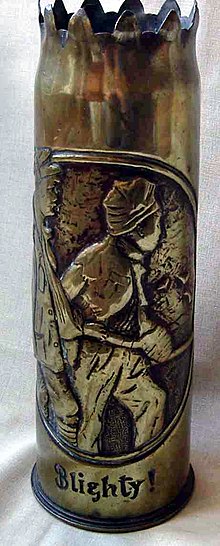Blighty
Blighty is an English slang term for Great Britain that is historically closely linked to the experience of the First World War (but is rarely used today, mostly with nostalgic or ironic intent).
etymology
The word is derived from the Hindi word vilāyatī (विलायती; also bilāyatī ), which in turn comes from Urdu from Arabic ( Arabic ولاية ' Wilaya ') was borrowed. In Hindustani as in Arabic, the word originally stood generally for domain or empire , but was then narrowed to the British Empire , which until 1947 also included British India . In their Dictionary of Anglo-Indian ( Hobson-Jobson ), published in 1886, Sir Henry Yule and Arthur C. Burnell stated that the word was used by the Indians to describe many things that the British had introduced as colonial rulers in India. The tomato was known as bilayati baingan , that is, “foreign / English aubergine ”, and soda water as bilayati pani “foreign / English water”. Through the British soldiers and officials stationed in India, the word passed into the English vocabulary and became a term for the homeland Great Britain.
"Blighty Wound"
During the First World War, the expression, especially in the phrase Dear Old Blighty , was associated with a nostalgic longing for home . As a blighty wound ("Blighty wound") the soldiers called a " home shot ", so an injury that resulted in a recall from the front and thus a return home. During this time, the word found its way into the vocabulary of war poets like Wilfred Owen and Siegfried Sassoon , but also into various music hall hits of the time ( I'm Glad I've Got a Bit of a Blighty One , Take Me Back to Dear Old Blighty ).
